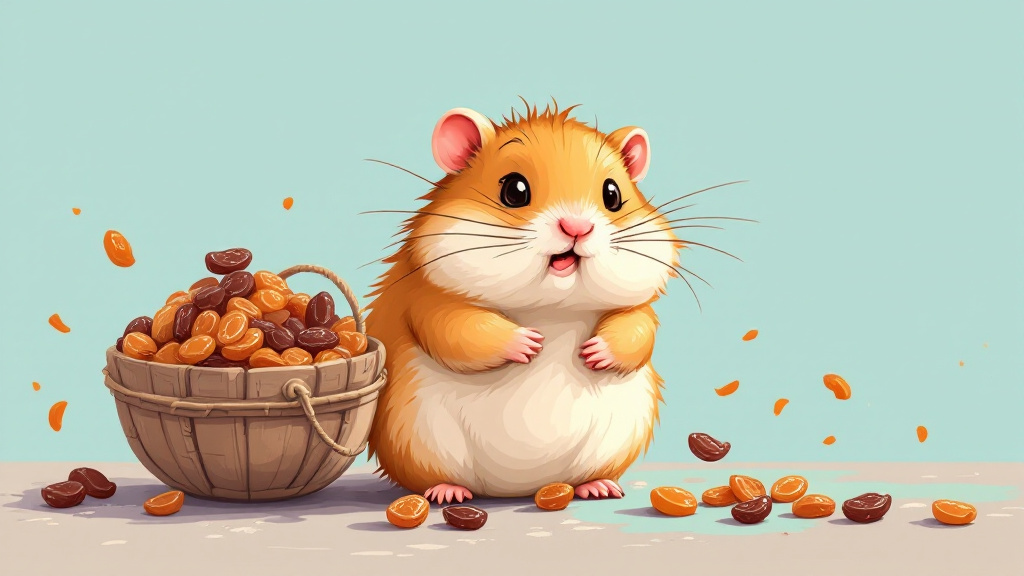When it comes to feeding our furry friends, it’s natural to wonder whether they can safely enjoy some of the snacks we love. Raisins, a sweet and convenient treat for humans, often fall into that category of curiosity. Can hamsters eat raisins? While it might seem harmless to offer them a small nibble, it’s essential to weigh the potential benefits and risks of this sugary dried fruit. Before offering raisins to your hamster, understanding both the pros and cons can help you make a more informed decision about their diet.
Can Hamsters Eat Raisins?
Short Answer: Yes, hamsters can eat raisins, but only in moderation.
Raisins aren’t toxic to hamsters, but they come with important caveats. The high sugar content and potential health risks associated with regular consumption mean that they should be treated as an occasional snack, not a dietary staple. While raisins offer some nutritional benefits, the dangers of overindulgence—such as obesity, diabetes, and digestive issues—make it essential to limit their intake.
Nutritional Value of Raisins
Raisins, as dried grapes, do have some nutritional perks that could benefit hamsters in small quantities:
- Fiber: Raisins are a good source of fiber, which is important for maintaining digestive health.
- Vitamins and Minerals: They provide B vitamins, calcium, and iron, all of which contribute to overall health and wellness.
However, despite these benefits, the downsides of their high sugar content and other risks must be carefully considered. While fiber and vitamins can be helpful, the potential harm from sugar overload outweighs the advantages, especially for such small animals.
Risks of Feeding Raisins to Hamsters
High Sugar Content
Raisins are naturally high in sugar, with a concentration about four times greater than fresh grapes. For hamsters, whose bodies are not designed to process large amounts of sugar, this can lead to serious health problems. Over time, consuming sugary foods like raisins can cause obesity and contribute to diabetes or other metabolic disorders. Hamsters are small creatures, and even small amounts of sugar can have a large impact on their overall health, making it crucial to limit sugary treats in their diet.
Digestive Issues
Hamsters have sensitive digestive systems, and excessive sugar from raisins can upset the delicate balance, leading to gastrointestinal issues. Overindulgence in raisins may result in diarrhea or lethargy as their small stomachs struggle to process the overload of sugar. These digestive problems can cause discomfort and, in severe cases, lead to dehydration or more serious health concerns.
Cheek Pouch Problems
One of the unique behaviors of hamsters is their tendency to hoard food in their cheek pouches. The sticky texture of raisins can pose a problem when hamsters store them there, leading to impaction. If the raisins stay lodged in the pouches too long, they can cause blockages, irritation, or even infections. In some cases, this might require veterinary intervention to remove the impacted food and treat any related issues.
Potential Toxicity Concerns
While raisins are not considered toxic to hamsters in the same way they are for dogs, some studies have indicated that dried fruits like raisins may have adverse effects on hamster cells in laboratory settings. Though these studies weren’t conducted on live animals, they raise questions about the potential long-term impacts of feeding raisins to hamsters. Until more conclusive research is done, it’s better to err on the side of caution.
Recommendations for Feeding Raisins
Moderation
If you decide to offer raisins to your hamster, it’s critical to do so in small amounts. Limit their portion to ¼ to ½ of a raisin and observe how your hamster reacts. If they show any signs of digestive distress or changes in behavior, it’s best to discontinue offering raisins altogether.
Frequency
Raisins should be treated as an occasional snack, not a regular part of your hamster’s diet. Given the risks associated with their high sugar content, it’s best to keep raisin treats infrequent and offer them sparingly, ensuring they remain a rare indulgence rather than a staple.
Healthier Alternatives
If you’re looking for safer, lower-sugar alternatives, consider offering your hamster fruits like cherries, raspberries, or melon. These fruits are less sugary and can provide variety without posing the same risks as raisins. Always make sure to feed these alternatives in moderation as well, as hamsters still need to maintain a balanced and controlled diet.
Conclusion
In summary, while hamsters can eat raisins, the potential health risks often outweigh the benefits. Raisins contain beneficial nutrients like fiber and vitamins, but their high sugar content and potential to cause digestive problems and cheek pouch issues make them less than ideal as a regular snack. Moderation is key—limit raisin portions and treat them as an occasional indulgence, while considering healthier fruit alternatives.
Ultimately, ensuring your hamster enjoys a balanced diet of hamster-safe foods, including pellets, hay, and safe fruits and vegetables, is the best way to support their long-term health and happiness.

